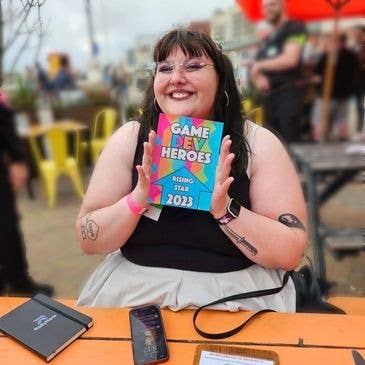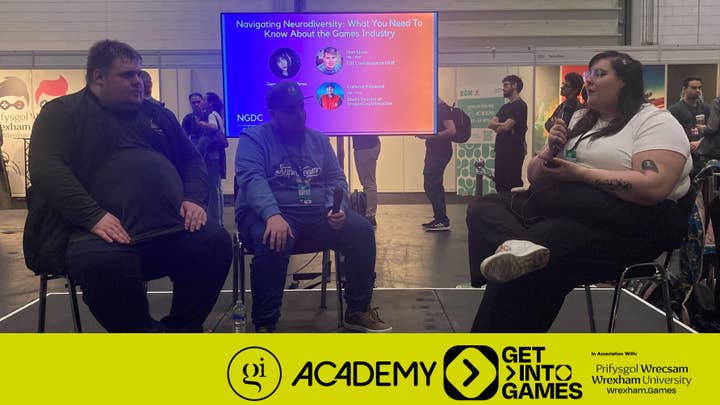Navigating neurodiversity: What you need to know about the games industry
Panel explores how neurodiverse people can succeed in their games career, and what support employers should offer
This article is part of our Get into Games special, offering students insight on life in the games industry and advice on how to get into the business. You can also find aselection of the best Academy guides for job-seekers here
Just because someone has an invisible disability doesn't mean their support needs are invisible, too. One in four working-age people have a disability, and even though it has long been unlawful for employers to discriminate against disabled people, just a tiny percentage of those in work have openly disclosed their disability to their employer, often due to fear of discrimination, dismissal, or both.
Increasingly the workplace is getting better at widening participation for, and retaining, disabled people, including those with neurodiverse differences such as autism (which includes autistic spectrum), ADHD, and specific learning difficulties like dyslexia and dyspraxia. However, support for neurodiversity – a term that seeks to move away from binary concepts of "typical" or "atypical" brains and instead embraces the notion that all human cognition is normal, just different – in the games industry can feel embryonic at best, and lacking at worse.
During an EGX 2023 talk, members of The Neurodivergent Game Dev Collective hosted a Q&A session to answer the burning questions of the game development community, and discuss their experiences of the games industry as a neurodivergent individual.
The panel included Neonhive's influencer executive Georgie Christoforou, DragonCog Interactive's studio director Cameron Keywood, and UKIE's equality, diversity, and inclusion co-ordinator Dom Shaw, who told budding devs not only how neurodiverse individuals can break into the UK games industry, but how they can thrive there, too.
- Should you disclose that you're neurodivergent in a job interview?
- Is it possible for people with neurodiverse conditions to achieve success in the games industry?
- Can a neurodiverse person set up their own studio?
- How can neurodivergent people navigate the difficulties of networking?
- What are the best ways a company can support neurodivergent employees?
Should you disclose that you're neurodivergent in a job interview?
There's no one-size-fits-all answer to this. Only you can decide whether or not you feel comfortable enough to tell the person interviewing you that you're neurodiverse. Sometimes, if you've read lots of excellent information about how the company is including and championing disabled people, you may feel it's right to tell them. Other times, you may not feel so comfortable. Both options are okay.
This is why it's vital that game developers and studios use their corporate websites and social media to clearly and regularly reinforce the support they offer to all disabled employees, including neurodiverse colleagues. By being upfront – and honest, of course – you're not only encouraging underrepresented groups to apply, but you're also making it clear to any prospective candidates what they can, and can't, expect when they join you.
"It depends on both your research of the company, and also your comfortability in those first ten minutes," Shaw said. "For example, if you don't see any supportive statements [on the websites], or content from a company around neurodiversity, I would be a bit concerned about sharing it upfront. I always say, do that research first."

Shaw suggested that if neurodiverse candidates are open to disclosing their needs, they should be encouraged to contact the HR team ahead of time to manage expectations for both parties.
"If you feel confident, you can always email the employer. So, for example, if you have ADHD, [you could say] 'I lose my focus quite a bit. Would it be possible to get this reasonable adjustment in the interview process?' And if you get an inclusive response back saying, 'Oh, yes, we'll make sure this is in place, we'll make sure you've got this, then, that's a good [sign]."
However, disclosure isn't right for everyone. Shaw acknowledged that sometimes you may feel more confident if you hold back this kind of information until you've secured your job and signed your contract first.
Christoforou said that during her time at Neonhive, she's "thrived" because her employer "has been understanding, listens, and has made accommodations" for her particular needs.
"This is the first time I think I've stayed in a job for longer than eight months because I'm actually looked after," she said. "So if you have the privilege of picking and choosing, it's very much worth looking out for that employer that's gonna look out for you."
Is it possible for people with neurodiverse conditions to achieve success in the games industry?
Of course neurodiverse people can thrive in the games industry! Keywood – who started DragonCog Interactive when they left university – "just can't see" why anyone with neurodiversity couldn't succeed in most roles in the games industry, and all panellists agreed.
"We are valuable assets," Christoforou said. "I think a lot of people don't realise how valuable a neurodivergent person can be on their team. When I'm at work, there's stuff that I do that none of my colleagues can do as fast as I can. We are valuable, and I know that I am now an invaluable part of our team."
"Everyone has this magic inside them," Shaw added. "There's a lot of negatives in society. And when you've got extra things on top of what's considered 'average', it can kind of wear you down.
"So treasure your special interests, your passions, what makes you happy. Make sure you find [professional or workplace] support networks and channels that are really going to uplift and empower you, then the opportunities will grow, they will develop, and then you will eventually create your own opportunities."
Can a neurodiverse person set up their own studio?
Keywood set up their own company when they graduated. Whilst they acknowledge that networking can be hard at times, especially when you're starting out or in your early career, it's important to "put yourself out there and meet people".
"I was half joking at the time when I said about starting my own studio," he said, a year on from establishing DragonCog. "But I looked into it and went from there."
"Don't forget to lean into your support because they will help you bloom into the greatness that you're determined to be… regardless if you don't know it yet"
Dom Shaw, UKIE
Keywood's top tip to people thinking of doing the same? Join a mentorship programme like Limit Break.
Christoforou agreed: "There are a lot of programmes within the industry now for marginalised people of all kinds. I've done Limit Break for the last two years, and you get so much valuable information from your mentor. I definitely would recommend that to anyone that's really, really interested in a games career."
How can neurodivergent people navigate the difficulties of networking?
Christoforou acknowledged that pretty much everyone has anxieties about networking, and admits that she's "never been particularly comfortable with it" either.

To better understand networking, Shaw suggested the audience think of a game with a reputation system, like GTA San Andreas or The Sims' relationship bar. The more you work for one gang or spend time with one Sim, the more they like you, and so forth. Now replace "gangs" with "developers", and that's essentially all networking is.
Don't worry if you find it hard at first, though – lots of people do, particularly neurodiverse individuals.
"I don't think I've grasped networking. I don't think I ever will," Christoforou admitted. "But I think maybe that's just the autistic thing. And that's fine."
That's why organisations like Christoforou's Neurodivergent Game Devs Collective are so valuable. They give you the chance to meet and network with other game devs who understand you and may face – or have even overcome – the same difficulties as you.
How can neurodivergent people protect themselves against unfair bias and the uncertainty of the industry right now?
The entire panel agreed that neurodivergent people should explore joining a union if they want protection from unfair bias.
"It's been a very, very unsettling time for the industry, so if you get a job in the industry, please join a union," said Christoforou. "Please protect yourself. It doesn't matter how amazing you think your studio is – anything can go wrong.
"The most vital thing is that you protect yourself. I think that the last couple of months in the industry have really shown that, and I think that's very, very important."
That said, when you do secure a job and think you may need equipment or changes to standard policies to do your job – or reasonable adjustments, as they're often called – don't be afraid to ask for additional support.
"This is the first time I think I've stayed in a job for longer than eight months because I'm actually being looked after"
Georgie Christoforou, Neonhive
"When it comes to talking about your reasonable adjustments, it's really hard, especially if it's your first job," Christoforou continued. "How are you meant to know your reasonable adjustments if you haven't done it yet? So if your employer isn't willing to take that journey with you and adapt to your needs, there's a problem.
"Most managers will actually try to be inclusive," Shaw added. "But if not, there are HR teams. There are leadership chains that can help."
How can companies best support neurodivergent employees?
The panelists shared a number of ways studios can better include their neurodiverse employees on top of legally required reasonable adjustments, including:
- Neurodiversity awareness training for all employees (as noted at Rockstar)
- Sensory-friendly rooms for neurodiverse colleagues to visit when they're stressed
- Four-day working weeks (as noted at Activision)
- Hybrid and remote working
- Talk to your employees; don't base your policies on assumptions and stereotypes
- Ensuring neurodivergent colleagues are treated fairly and in line with neurotypical colleagues
- Clearly and transparently make characters in your games more inclusive of neurodiversity
"I feel like remote working shouldn't be a debate," Christoforou said. "It should be something that studios offer – especially big studios.
"A lot of studios have laid off a lot of their employees because they are forcing everybody back into the office. Just think about how much neurodivergent talent you're losing."
Shaw talked extensively about the issues he'd had with prior companies, both in and out of the gaming sector, and stressed the importance of neurodiverse individuals knowing their rights before they get a job.
"If you can remote work and it feels comfortable, and you can make that work-life balance at home, that can truly help you overcome a lot of adversity," he explained. "It sounds like a really simple thing, but having your own space, being able to tell yourself, 'I need to turn off for a bit', or 'I need to have a nap' is really, really powerful to your working dynamic.

"It not only makes you more productive but value yourself a bit more. That's not to say if you want to work in the office, you shouldn't – you can! The difference is when a company enforces the office. That's a bit of a red flag to me."
Shaw then talked about 'all-digital' workplace Lovewish, which not only enables all colleagues to work online remotely but also allows time and virtual space for employees to chat via "online water cooler conversations" and network, too – something neurodivergent people can sometimes struggle with.
But these kinds of initiatives aren't unique to indie outfits. Shaw also cited Ubisoft UK as a company that has gone to great lengths to improve support for neurodiverse employees too, and has appointed a director for neurodiverse activity.
"I get passionate about these things because I want everyone here to be happy," Shaw said.
"That's what's so special about people who are neurodiverse. There's always something special in you. You just have to grow some resilience, keep smiling, keep looking. And don't forget to lean into your support because they will help you bloom into the greatness that you're determined to be… regardless if you don't know it yet."
For more tips and resources or to find out more about the Neurodivergent Game Devs Collective, visit: linktr.ee/thengdc.
More GamesIndustry.biz Academy guides on supporting neurodiversity
- Tips to support your neurodiverse team
- Understanding and supporting neurodiversity in the workplace
- Diversity isn't only skin deep: Accommodating autistic and neurodiverse people
This article is part of our Get into Games special. You can find more talks and panels via the video links here, and a selection of the best Academy guides for job-seekers here.


